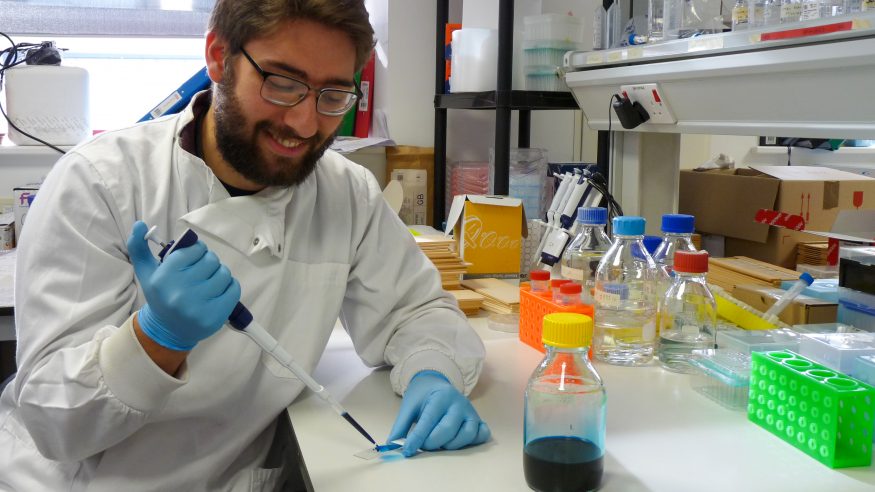Developing vital early treatments for pancreatic cancer
4 March 2024
Pancreatic cancer currently has a 10-year survival rate of just 5%. As the disease can be difficult to detect until its late stages, intervention often comes too late for many patients. Josh D’Ambrogio (Biosciences 2021-) has been studying pancreatic cancer in its early development to open up further avenues for early detection and more effective treatment strategies.
My research investigates how obesity affects the ability of the adult pancreas to protect itself from mutant cells that could become cancerous. Previous research from Catherine Hogan’s lab, where I’m based, found that a healthy pancreas has this really cool tumour preventative process where it removes mutant cells from its epithelial (protective) layer. But they also found that this process can sometimes fail, leading to the development of pancreatic cancer. So, if the pancreas can protect itself when it’s healthy, what is it that inhibits this process and allows a tumour to develop?
We know that obesity is one of biggest risk factors for pancreatic cancer, and so we’ve been looking at how this specifically impacts the tumour preventative process. We’ve also investigated how obesity impacts the general ability of the pancreas to stay healthy, and how this influences mutant cancer cells to diminish the health of the tissue.
We’re reaching the end of our project now, and what we’re seeing is that not only are obesity and other factors involved in ‘switching off’ the tumour preventative process, but that this ‘switching off’ may not be permanent. Our next question is whether we can reactivate this process – and if so, how? This would provide a method of protecting the pancreas from cancer-causing cells at an early stage, using the body’s own defence mechanisms. We need more research to fully understand how the body defends against cancer. This could then lead to new treatments, which could reactivate these defence mechanisms. Also, by understanding how risk factors such as obesity cause cancer, our research could also influence policy and cancer prevention strategies in the future.
Our work simply can’t happen without the people that support us, and I’m incredibly grateful to the donors and fundraisers that have put their faith in this project. The funding I’ve received to support my research has made a massive difference – our team has been able to ask the questions that could have a major positive impact on pancreatic cancer patients in the future.
To learn more about the link between early pancreatic cancer and high fat diets, watch Josh and Dr Catherine Hogan’s Research Showcase webinar.
Find out more about cancer research at Cardiff University.
- January 2026
- November 2025
- September 2025
- July 2025
- June 2025
- May 2025
- April 2025
- March 2025
- February 2025
- January 2025
- October 2024
- September 2024
- August 2024
- July 2024
- June 2024
- May 2024
- April 2024
- March 2024
- February 2024
- January 2024
- December 2023
- November 2023
- October 2023
- September 2023
- August 2023
- July 2023
- June 2023
- May 2023
- April 2023
- March 2023
- February 2023
- January 2023
- November 2022
- October 2022
- September 2022
- August 2022
- July 2022
- June 2022
- May 2022
- April 2022
- March 2022
- February 2022
- January 2022
- December 2021
- November 2021
- October 2021
- September 2021
- August 2021
- July 2021
- June 2021
- May 2021
- April 2021
- March 2021
- February 2021
- January 2021
- December 2020
- November 2020
- October 2020
- September 2020
- August 2020
- July 2020
- June 2020
- May 2020
- April 2020
- March 2020
- January 2020
- December 2019
- November 2019
- October 2019
- September 2019
- August 2019
- July 2019
- May 2019
- April 2019
- March 2019
- February 2019
- January 2019
- December 2018
- November 2018
- October 2018
- September 2018
- August 2018
- July 2018
- June 2018
- May 2018
- April 2018
- March 2018
- February 2018
- December 2017
- November 2017
- October 2017
- September 2017
- August 2017
- July 2017
- June 2017
- May 2017
- April 2017
- March 2017
- February 2017
- January 2017
- November 2016
- October 2016
- September 2016
- July 2016
- June 2016
- May 2016
- April 2016
- March 2016
- February 2016
- January 2016
- December 2015
- November 2015
- October 2015
- September 2015
- August 2015
- January 2015
- December 2014
- November 2014
- September 2014
- August 2014
- May 2014